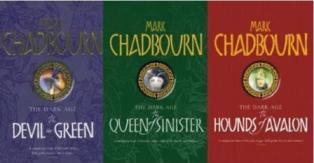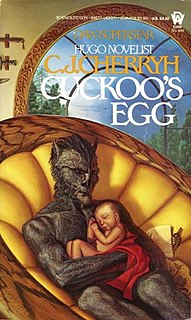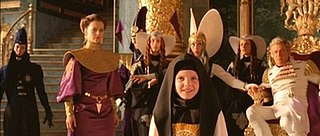Related Research Articles

Franklin Patrick Herbert Jr. was an American science fiction author best known for the 1965 novel Dune and its five sequels. Though he became famous for his novels, he also wrote short stories and worked as a newspaper journalist, photographer, book reviewer, ecological consultant, and lecturer.

Kevin James Anderson is an American science fiction author. He has written spin-off novels for Star Wars, StarCraft, Titan A.E. and The X-Files, and with Brian Herbert is the co-author of the Dune prequel series. His original works include the Saga of Seven Suns series and the Nebula Award-nominated Assemblers of Infinity. He has also written several comic books, including the Dark Horse Star Wars series Tales of the Jedi written in collaboration with Tom Veitch, Dark Horse Predator titles, and The X-Files titles for Topps. Some of Anderson's superhero novels include Enemies & Allies, about the first meeting of Batman and Superman, and The Last Days of Krypton, telling the story of how Superman's planet Krypton came to be destroyed.

Gregory Dale Bear is an American writer and illustrator best known for science fiction. His work has covered themes of galactic conflict, artificial universes, consciousness and cultural practices, and accelerated evolution. His most recent work is the 2021 novel The Unfinished Land. Greg Bear has written over 50 books in total. Greg Bear was also one of the five co-founders of the San Diego Comic-Con.
David Zindell is an American writer known for science fiction and fantasy epics.

Raphael Aloysius Lafferty was an American science fiction and fantasy writer known for his original use of language, metaphor, and narrative structure, as well as for his etymological wit. He also wrote a set of four autobiographical novels, In a Green Tree; a history book, The Fall of Rome; and several novels of historical fiction.

Lady Jessica is a fictional character in the Dune universe created by Frank Herbert. A main character in the 1965 novel Dune, Jessica also plays an important role in the later installment Children of Dune (1976). The events surrounding Jessica's conception, her birth and her early years with Leto are chronicled in the Prelude to Dune prequel trilogy (1999–2001) by Brian Herbert and Kevin J. Anderson. The character is brought back as a ghola in the Herbert/Anderson sequels which conclude the original series, Hunters of Dune (2006) and Sandworms of Dune (2007).

Dune, also known as the Dune Chronicles, is a science fiction media franchise that originated with the 1965 novel Dune by Frank Herbert and has continued to add new publications. Dune is frequently described as the best selling science fiction novel in history. It won the inaugural Nebula Award for Best Novel in 1965 and the 1966 Hugo Award, and was later adapted into a 1984 film, a 2000 television miniseries, and a 2021 film. Herbert wrote five sequels, the first two of which were adapted as a miniseries called Frank Herbert's Children of Dune in 2003. Dune has also inspired some traditional games and a series of video games. Since 2009, the names of planets from the Dune novels have been adopted for the real-world nomenclature of plains and other features on Saturn's moon Titan.

Terry Ballantine Bisson is an American science fiction and fantasy author. He is best known for his short stories, including "Bears Discover Fire", which won the Hugo Award and the Nebula Award, and "They're Made Out of Meat".
Donald Henry Tuck was an Australian bibliographer of science fiction, fantasy and weird fiction. His works were "among the most extensive produced since the pioneering work of Everett F. Bleiler."
Neverness is a science fiction novel by American writer David Zindell, published in 1988. The related novelette "Shanidar" won the Writers of the Future contest in 1985.

The Dark Age is a trilogy by Mark Chadbourn set around the beginning of the third millennium. While the previous series was a clear fantasy story, this has strings of gothic horror and existentialism woven into it.
The Broken God is a science fiction novel by American writer David Zindell, published in 1992. It is the first novel of the trilogy A Requiem for Homo Sapiens. The Broken God is essentially a coming of age tale of a youngster named Danlo, but at a much grander scale on a faraway planet in the distant future. Interspersed throughout the novel there is also much philosophical contemplation and musings on subjects ranging from mysticism to linguistics and metaphysics.

Cuckoo's Egg is a science fiction novel by American writer C. J. Cherryh, which introduces a fictional race raising a human boy. It was published by DAW Books in 1985, and there was also a limited hardcover printing by Phantasia Press in the same year. The book was nominated for the Hugo Award and longlisted the Locus Award for Best Novel. It was later reprinted along with Cherryh's novel Serpent's Reach in the 2005 omnibus volume The Deep Beyond.

Orion is a manga by Masamune Shirow, first serialized in 1990 and 1991 in Seishinsha Comic Gaia magazine.
Victor Woodward Milán was an American writer known for libertarian science fiction and an interest in cybernetics.

Space opera is a subgenre of science fiction that emphasizes science fictional space warfare, with use of melodramatic, risk-taking space adventures and chivalric romance. Set mainly or entirely in outer space, it features technological and social advancements in faster-than-light travel, futuristic weapons, and sophisticated technology, on a backdrop of galactic empires and interstellar wars with fictional aliens, often in fictional galaxies. The term has no relation to music, as in a traditional opera, but is instead a play on the terms "soap opera", a melodramatic television series, and "horse opera", which was coined during the 1930s to indicate a clichéd and formulaic Western movie. Space operas emerged in the 1930s and continue to be produced in literature, film, comics, television, and video games.

Multiple organizations of the Dune universe dominate the political, religious, and social arena of the setting of Frank Herbert's Dune series of science fiction novels, and derivative works. Set tens of thousands of years in the future, the saga chronicles a civilization which has banned computers but has also developed advanced technology and mental and physical abilities through physical training, eugenics and the use of the drug melange. Specialized groups of individuals have aligned themselves in organizations focusing on specific abilities, technology and goals. Herbert's concepts of human evolution and technology have been analyzed and deconstructed in at least one book, The Science of Dune (2008). His originating 1965 novel Dune is popularly considered one of the greatest science fiction novels of all time, and is frequently cited as the best-selling science fiction novel in history. Dune and its five sequels by Herbert explore the complex and multilayered interactions of politics, religion, ecology and technology, among other themes.
We've a three-point civilization: the Imperial Household balanced against the Federated Great Houses of the Landsraad, and between them, the Guild with its damnable monopoly on interstellar transport.

The Hum and the Shiver is an urban fantasy novel by American writer Alex Bledsoe, first published in the United States in September 2011 by Tor Books. It is the first in a series of six books by Bledsoe about the Tufa living in a remote Appalachian valley in East Tennessee. The Tufa are descendants of Irish fairies and were found in the area when the first European settlers arrived.
References
- ↑ Charles N. Brown. "David Zindell: Back to Roots" (excerpt), Locus , v44:6 No.473 June 2000. Retrieved on 2000-09-07.
- ↑ Simeon Shoul. "The Lightstone by David Zindell (book review)". Infinity Plus.
- ↑ Dave Langford. "Danlo of Dune - Idle Thoughts on War in Heaven". The New York Review of Science Fiction.
- ↑ Curt Wohleber. "The Wild (book review)". SciFi.com.